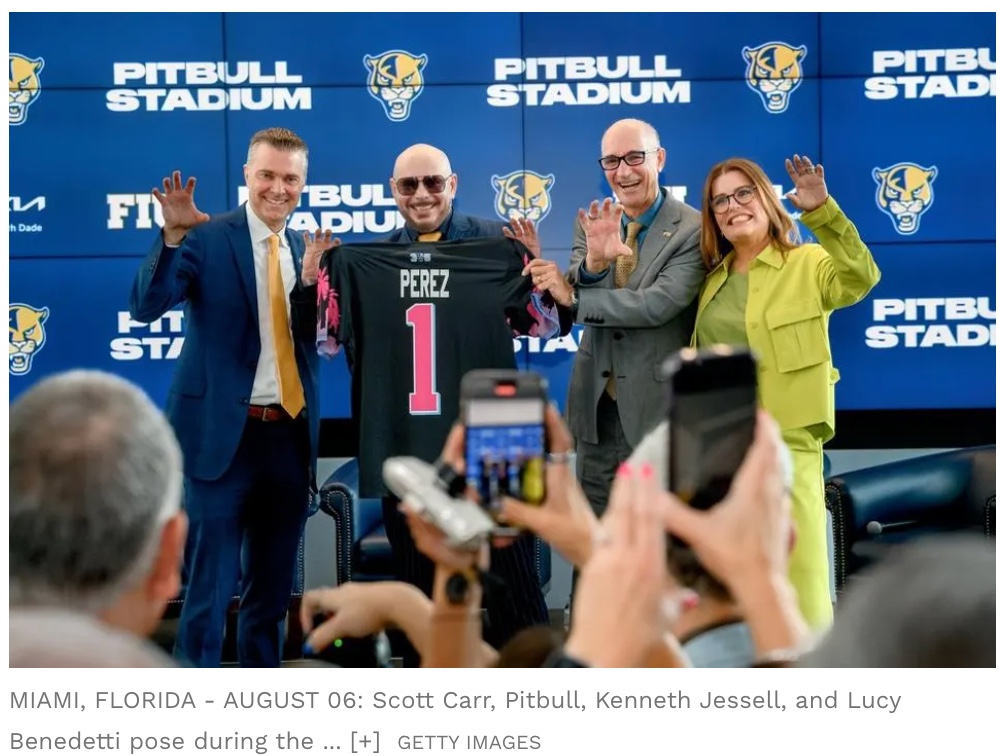Pitbull, the Miami-born rapper and global music sensation, has made a significant move into the world of sports by purchasing the naming rights to Florida International University’s (FIU) football stadium. The deal, reportedly worth $6 million, is not just a financial investment but a symbolic gesture that strengthens the connection between the artist and his hometown. The stadium, which will now bear his name, is set to become an iconic landmark, further embedding Pitbull’s legacy in Miami’s cultural and sporting landscape.
Pitbull, born Armando Christian Pérez, started his music career in the early 2000s, quickly gaining popularity for his energetic performances and catchy, danceable tracks. He first gained attention with his debut album *M.I.A.M.I.* in 2004, which showcased his unique blend of reggaeton, crunk, and hip-hop. Over the years, Pitbull has evolved from a local Miami rapper to an international superstar, earning the nickname “Mr. Worldwide.” His hits like “Give Me Everything” and “Timber” have topped charts globally, making him one of the most successful Latin artists of all time.
Pitbull’s popularity stems not only from his music but also from his charismatic personality and business acumen. He has diversified his career with ventures into brand endorsements, acting, and now sports, making him a multifaceted figure in the entertainment industry. His decision to buy the naming rights to FIU’s football stadium reflects his deep roots in Miami and his desire to give back to the community that supported him from the start.
Pitbull is not the first celebrity or musician to venture into the naming rights game. Jay-Z, another music mogul, was instrumental in the creation of the Barclays Center in Brooklyn, which is home to the NBA’s Brooklyn Nets. While he didn’t purchase the naming rights outright, his influence on the branding and design of the stadium is undeniable, and his The 40/40 Club inside the arena is a testament to his impact.
More recently, Drake, the Canadian rapper, struck a deal with the Toronto Raptors, becoming the global ambassador for the team and lending his brand to the Scotiabank Arena, where the Raptors play. Though Drake didn’t purchase the naming rights, his close association with the team and the stadium has made it a centerpiece of his brand.
These examples show that Pitbull’s move is part of a growing trend among celebrities and musicians who see the value in associating their names with major sports venues. The investment not only elevates their brand but also ties them to the local communities in a lasting way.
In recent years, buying naming rights for stadiums has become increasingly popular among companies and individuals. This trend reflects the growing recognition of the marketing power that comes with associating a brand with a major sports venue. For companies, it’s a way to gain visibility and prestige, especially if the stadium hosts high-profile events. For celebrities, it’s an opportunity to solidify their legacy in a meaningful way.
Naming rights deals have become a significant revenue stream for sports teams and universities, often running into the tens or even hundreds of millions of dollars. For example, the deal between American Airlines and the Miami Heat for the naming rights to the American Airlines Arena was worth $42 million. As more companies and individuals recognize the potential return on investment from these deals, the trend shows no signs of slowing down.
Pitbull’s $6 million investment in FIU’s football stadium is a reflection of this trend, and it highlights how naming rights have become a key strategy for those looking to make a lasting impact in both the business and cultural spheres.
Pitbull Buys Naming Rights to FIU’s Football Stadium in $6M Contract Agreement

